|
|
|
Sort Order |
|
|
|
Items / Page
|
|
|
|
|
|
|
| Srl | Item |
| 1 |
ID:
182451
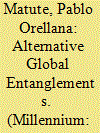

|
|
|
|
|
| Summary/Abstract |
While the call for broader conceptions about the political in general, and International Relations in particular, points to the need to redirect attention to the entanglements of societies, species and environments, in this article I address the way in which this proposed shift might still be reproducing anthropocentric understandings of global politics if serious attention is not devoted to the ontological foundations of the discipline. To do so, I first engage in a problematisation of decolonial efforts drawn from the Latin American experience that stress knowledge diversification as a means to emancipation. I then attempt to demonstrate that an exclusive intellectual engagement with entanglements and detachments might also be misleading, for their conventional conception is dependent on certain ontological commitments inherent to knowledge production, namely mind-world dualism and the linear conception of time. I therefore propose the notion of ‘detachment from knowledge’ as an alternative ontological practice through which IR students can themselves grapple with the dualist and anthropocentric oppressor/victim logic at the root of any emancipatory project. Such practice, I finally argue, not only allows us to understand the ‘global’ as indivisible, but also to engage with it beyond the exclusive pursuit of emancipation through knowledge, however diverse or decolonial it might be.
|
|
|
|
|
|
|
|
|
|
|
|
|
|
|
|
| 2 |
ID:
182449
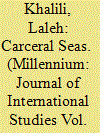

|
|
|
|
|
| Summary/Abstract |
In his haunting ‘The Sea Is History’, the great Trinidadian poet Derek Walcott marries the story of the maritime transportation of enslaved Africans to the narrative progression of the Old Testament:
|
|
|
|
|
|
|
|
|
|
|
|
|
|
|
|
| 3 |
ID:
182450
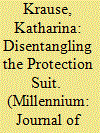

|
|
|
|
|
| Summary/Abstract |
The protection suit is the icon of infectious disease outbreaks. I argue that the protection suit has performative power not only by shaping the daily tasks of health workers and their interaction with patients, but also as a visual artefact and as a two-dimensional image determining how health crises and their security implications are understood and dealt with. The article proceeds in three steps: it firstly highlights the current absence of visuality in the academic literature on health security and makes the case for including it in the debate. Secondly, with recourse to Actor-Network Theory (ANT) it theoretically locates visual representations, as images and artefacts, as actors that act and enact each other in the health-security nexus. The third part of the article follows the protection suit during the Ebola epidemic in West Africa and maps the visual network it creates. In doing so this article demonstrates how the suit as artefact and image constitutes a network that visually and sensually links the bodies of patients, health workers and distant viewers in complex and at times competing makings of health security.
|
|
|
|
|
|
|
|
|
|
|
|
|
|
|
|
| 4 |
ID:
182452
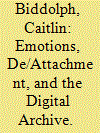

|
|
|
|
|
| Summary/Abstract |
The study of global politics is not an exercise in objectivity and rationality, but one that is embodied, personal, and deeply affective. Feminist scholarship both within and outside of International Relations (IR) have pioneered discussions of embracing our affective experiences as researchers, as well as maintaining ethical commitments to research participants and collaborators. In addition to feminist contributions, the emotional turn in IR has seen the emergence of vibrant scholarship exploring the role of emotions in sites and processes of global politics, as well as the role of emotions in the research process. In this article, I aim to contribute to this growing body of scholarship by speaking to these and other questions that explore the role of emotions in researchers’ engagement with their work. In particular, I draw on and interrogate my own emotional entanglements with the digital archives of the International Criminal Tribunal for the former Yugoslavia (ICTY). The goal of this article is to provide insights into the emotional process of reading and interpreting testimonies of violence, and to illuminate ethical concerns that arise – particularly as an ‘outsider’ – when reading and representing trauma in my research.
|
|
|
|
|
|
|
|
|
|
|
|
|
|
|
|
| 5 |
ID:
182447


|
|
|
|
|
| Summary/Abstract |
The question of how we can grasp entanglements and detachments as researchers who are intimately entangled with the worlds we study was never solely an issue of academic curiosity. This past year we struggled to keep up with the shifting grounds as the global pandemic escalated political crises and generated ruptures and losses in our lives, societies and universities, in ways that touched some more than others. In the midst of this disorientation, we have grappled with and failed to make sense of the politics of the present. Having the space to think through these politics with you and with each-other has meant much more to us than an academic exercise. It has held the space for us to think, feel and make sense together, entangled within a power-laden and at times alienating university system that nevertheless contains the possibility for different, if not better, realities.
|
|
|
|
|
|
|
|
|
|
|
|
|
|
|
|
| 6 |
ID:
182454
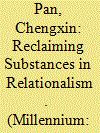

|
|
|
|
|
| Summary/Abstract |
The relational turn in International Relations (IR) has made important contributions by challenging the substantialist claim to substance/thing as ontological primitives, by drawing much-needed attention to relations as ontologically fundamental, and by introducing a diversity of relational ways of being/becoming, knowing and doing. Yet, while rightly repudiating substantialism, the relational turn has remained ambivalent about the concept of substance itself, leaving open an important question: How should we understand substance within a relational ontology? As a result, we are left with different and sometimes confusing positions on the issue of substances vis-à-vis relations. Seeing this gap as a missed opportunity for relationalism in IR, this article seeks to bring substance back in without falling back into substantialism. It draws on a quantum conception of substance via the idea of quantum holography (QH) and its related notion of whole-part duality, and stresses the little-understood dual and inseparable nature of substance-relation (‘relatance’). The concept of substance-relation duality not only enriches our relational thinking, but also allows us to engage in relational analysis through a reimagined notion of substance. To illustrate, the article turns to a substance-based relational analysis of US-China relations.
|
|
|
|
|
|
|
|
|
|
|
|
|
|
|
|
| 7 |
ID:
182448
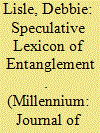

|
|
|
|
|
| Summary/Abstract |
This intervention offers a speculative lexicon to help students and scholars of global politics think critically and creatively about entanglement. It is neither definitive nor complete, but instead offers some possible points of entry into a contested field. It mobilises two particular claims: (1) that entanglement always involves both human and non-human entities; and (2) that entanglement is always emergent and in process. As a whole, this speculative lexicon is intended to help us sense the moment when entanglements intensify in ways that render them stable; attune to these durabilities in order to analyse their constitutive logics of inclusion/exclusion; acknowledge our own irrevocable entanglement in these logics; care for those bodies, lifeworlds, species and habitats that are targeted or abandoned by such logics; and craft mutual projects to disrupt, disaggregate and re-route these logics. Because entanglements are always emerging, dissipating and reconvening, the practice of navigating this open terrain is disorienting and often frustrating. We may desire a final destination where entanglements solidify and horizons magically appear, but giving in to that desire reproduces the violence of enclosure. This lexicon is offered as a way to keep the political terrain of entanglement open so we can collectively ensure that contestation remains a possibility.
|
|
|
|
|
|
|
|
|
|
|
|
|
|
|
|
| 8 |
ID:
182455
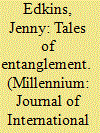

|
|
|
| 9 |
ID:
182453


|
|
|
|
|
| Summary/Abstract |
The last decade of the Cold War and the early years of the post-Cold War international order saw the emergence of a radical conservatism in Japan which has since taken root as a key ideological force in the country’s conservative political culture. This article traces the neglected but important influence of José Ortega y Grasset’s theory of the masses on this contemporary movement. However, in this journey across time, space, and culture, the theory of mass society has mutated. The article examines the ways in which Japanese radical conservative thinkers Susumu Nishibe and Keishi Saeki interpreted and applied Ortega’s work to critique the development of Japan’s contemporary political landscape. Radical conservatives transformed Ortega’s theory of the modern masses and his argument for elite liberalism into a critique of the liberal international order which favours reactionary nationalism. To understand this shift, the article examines the conceptualisations of modernisation and national identity as a necessary background to such theoretical and political appropriation.
|
|
|
|
|
|
|
|
|
|
|
|
|
|
|
|
|
|
|
|
|